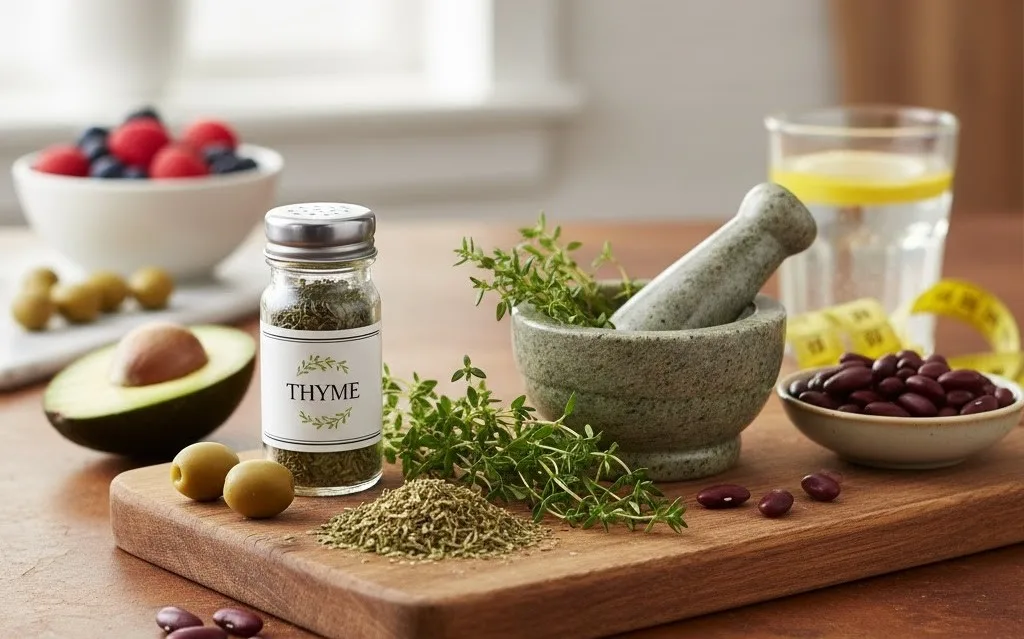Often lauded for its aromatic qualities and versatility in the kitchen, thyme (آویشن - "Avishan" in Persian) is a popular herb used across various cuisines. Beyond its culinary appeal, a common belief, as highlighted in a recent infographic, suggests that incorporating thyme as a spice in foods could offer benefits for cardiovascular health, specifically in the reduction of blood pressure and cholesterol.
The Humble Herb: Thyme
Thyme is a member of the mint family (Lamiaceae) and is native to the Mediterranean region. Its small, fragrant leaves are packed with essential oils, giving it a distinctive earthy, minty, and slightly citrusy flavor. It's a staple in many dishes, from roasted vegetables and meats to soups and stews.
Traditional Use and Modern Interest
For centuries, thyme has been valued not only for its flavor but also for its medicinal properties in traditional medicine systems. It's been used to treat respiratory issues, digestive problems, and as an antiseptic. Modern scientific research has begun to explore these traditional claims, focusing on the compounds within thyme, such as thymol and carvacrol, which are potent antioxidants and possess anti-inflammatory properties.
The Link to Blood Pressure and Cholesterol
The infographic points to thyme's potential role in managing blood pressure and cholesterol levels. While it's important to note that dietary changes and lifestyle modifications are key components of cardiovascular health, and no single food or spice should be considered a standalone cure, research does offer some insights into how thyme might contribute:
-
Antioxidant Properties: Thyme is rich in antioxidants that help combat oxidative stress in the body. Oxidative stress can damage blood vessels and contribute to the development of atherosclerosis (hardening of the arteries), which is linked to high blood pressure and cholesterol.
-
Anti-inflammatory Effects: Chronic inflammation is another factor in cardiovascular disease. The anti-inflammatory compounds in thyme may help reduce inflammation in the arteries, potentially supporting better blood vessel function.
-
Specific Compounds: Some studies have investigated the effects of thymol and carvacrol on various physiological processes. While more human-based research is needed, preliminary findings in some studies suggest a potential for these compounds to influence vascular relaxation and lipid metabolism.
How to Incorporate Thyme into Your Diet
Adding thyme to your diet is simple and delicious:
-
Seasoning: Use fresh or dried thyme to season poultry, fish, and red meats.
-
Vegetables: Sprinkle over roasted potatoes, carrots, or mushrooms.
-
Soups and Stews: Enhance the flavor of your favorite hearty dishes.
-
Marinades: Create flavorful marinades for grilling or baking.
-
Herbal Teas: Brew fresh thyme in hot water for a soothing herbal tea.
Important Considerations
While incorporating thyme into your diet is generally safe and healthy, it's crucial to remember:
-
Not a Replacement for Medical Treatment: Thyme and other dietary interventions should not replace prescribed medications or medical advice for managing high blood pressure or cholesterol.
-
Balanced Diet and Lifestyle: The most effective approach to cardiovascular health involves a balanced diet rich in fruits, vegetables, and whole grains, regular physical activity, maintaining a healthy weight, and avoiding smoking.
-
Consult Your Doctor: If you have concerns about your blood pressure or cholesterol, always consult with a healthcare professional to discuss appropriate management strategies.
In conclusion, while thyme is a delightful addition to any meal, its potential health benefits, particularly concerning blood pressure and cholesterol, warrant further scientific exploration. Enjoying this fragrant herb as part of a balanced and healthy lifestyle could be a flavorful step towards supporting your overall well-being.

